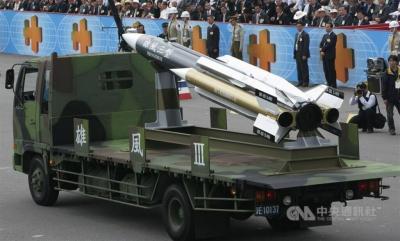One out of 10 drinking water faucets failed a government safety inspection, as it was found that the device contained an excessive amount of lead, the Bureau of Standards, Metrology and Inspection (BSMI) said on Thursday.
The 10 faucets were purchased online or at local stores from April 7 to May 6 last year, the bureau and the Consumers’ Foundation, which jointly conducted the inspection, told a news conference in Taipei.
Inspectors tested the levels of heavy metals in the faucets and found that parts of one of them — a two-way kitchen faucet from the Lolat brand — was more than 0.25 percent lead by weight, Consumers’ Foundation Secretary-General Hsu Tse-yu (徐則鈺) said.

Photo: Lo Chi, Taipei Times
Four other products were found to be improperly labeled, he added.
BSMI section chief Wang Chun-chao (王俊超) said that that vendors have been ordered to remove the Lolat faucet from shelves.
The manufacturers of the four improperly labeled faucets were ordered to change the packaging or would be fined up to NT$1 million (US$35,778) in accordance with the Commodity Inspection Act (商品檢驗法), Wang added.
People who have the Lolat faucet installed should contact the manufacturer as soon as possible, Wang said.
According to the US Environmental Protection Agency, exposure to lead poses a health risk especially to fetuses and young children.
Children who are exposed to even low levels of lead might sustain damage to their central and peripheral nervous system, which might lead to learning disabilities, shorter stature and impaired hearing, and affect the formation and functioning of blood cells, the US agency said.
The BSMI has since 2017 conducted inspections of drinking water faucets, the bureau said.
The materials used in such faucets must contain less than 0.25 percent lead by weight, and water from the faucets must not contain more than 5 parts per billion of lead, the bureau said.
The packaging of drinking water faucets should feature a “lead free” label and contain information that water from the devices is drinkable, it said.

STATS: Taiwan’s average life expectancy of 80.77 years was lower than that of Japan, Singapore and South Korea, but higher than in China, Malaysia and Indonesia Taiwan’s average life expectancy last year increased to 80.77 years, but was still not back to its pre-COVID-19 pandemic peak of 81.32 years in 2020, the Ministry of the Interior said yesterday. The average life expectancy last year increased the 0.54 years from 2023, the ministry said in a statement. For men and women, the average life expectancy last year was 77.42 years and 84.30 years respectively, up 0.48 years and 0.56 years from the previous year. Taiwan’s average life expectancy peaked at 81.32 years in 2020, as the nation was relatively unaffected by the pandemic that year. The metric

Taiwan High Speed Rail Corp. (THSRC) plans to ease strained capacity during peak hours by introducing new fare rules restricting passengers traveling without reserved seats in 2026, company Chairman Shih Che (史哲) said Wednesday. THSRC needs to tackle its capacity issue because there have been several occasions where passengers holding tickets with reserved seats did not make it onto their train in stations packed with individuals traveling without a reserved seat, Shih told reporters in a joint interview in Taipei. Non-reserved seats allow travelers maximum flexibility, but it has led to issues relating to quality of service and safety concerns, especially during

A magnitude 5.1 earthquake struck Chiayi County at 4:37pm today, the Central Weather Administration (CWA) said. The hypocenter was 36.3km southeast of Chiayi County Hall at a depth of 10.4km, CWA data showed. There were no immediate reports of damage resulting from the quake. The intensity of the quake, which gauges the actual effect of a seismic event, measured 4 in Chiayi County, Tainan and Kaohsiung on Taiwan's seven-tier intensity scale, the data showed. The quake had an intensity of 3 in Chiayi City and Yunlin County, while it was measured as 2 in Pingtung, Taitung, Hualien, Changhua, Nantou and Penghu counties, the data

The Supreme Court today rejected an appeal filed by former Air Force officer Shih Chun-cheng (史濬程), convicted of Chinese Communist Party (CCP) espionage, finalizing his sentence at two years and two months for contravening the National Security Act (國家安全法). His other ruling, a ten-month sentence for an additional contravention, was meanwhile overturned and sent to the Taichung branch of the High Court for retrial, the Supreme Court said today. Prosecutors have been notified as Shih is considered a flight risk. Shih was recruited by Chinese Communist Party (CCP) intelligence officials after his retirement in 2008 and appointed as a supervisor